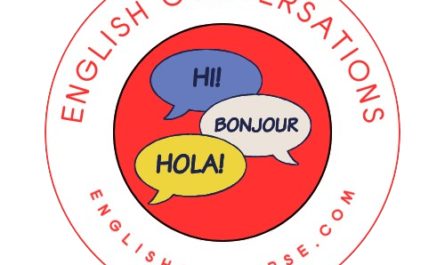Watch on TikTok with Spanish Captions
@english.languages Idioms & Sayings in English Language With Spanish Subtitles #english #spanish #englishtospanish #spanishtiktok #spanishtoenglish #learnenglish #speakenglish #englishsayings ♬ original sound – EnglishConversations
Idioms and Phrases

Learning a new language can be a challenging task, especially when it comes to mastering the nuances and expressions that make a language unique.
One of the key elements of becoming fluent in English is being able to use idioms and phrases effectively. Idioms and phrases are expressions that have a figurative meaning, different from the literal interpretation of the words used.
They add color and depth to the language, helping you sound more like a native speaker.
Why are Idioms and Phrases Important?
Idioms and phrases are an integral part of any language, and English is no exception. They are used in everyday conversations, literature, movies, and even in business settings. Understanding and using idioms and phrases can help you connect with native speakers on a deeper level, as they provide insight into the culture, history, and values of a language.
Here are a few reasons why learning idioms and phrases is important:
- Enhanced Communication: Idioms and phrases can convey complex ideas and emotions in a concise and impactful manner. They add depth and richness to your language skills, allowing you to express yourself more effectively.
- Cultural Understanding: Idioms and phrases often have cultural references and origins. By learning them, you gain a deeper understanding of the culture and traditions associated with the language.
- Improved Listening Skills: Native speakers frequently use idioms and phrases in their conversations. By familiarizing yourself with these expressions, you can better understand and follow conversations.
- Impressiveness: Using idioms and phrases appropriately can make you sound more fluent and natural in English. It showcases your language proficiency and can leave a lasting impression on others.
Tips for Learning and Using Idioms and Phrases
While idioms and phrases can be fun to learn and use, they can also be challenging to master. Here are some tips to help you incorporate them into your English conversations:
- Read and Listen: Expose yourself to English literature, newspapers, podcasts, and movies to encounter idioms and phrases in context. Pay attention to how they are used and try to understand their meanings.
- Contextualize: Idioms and phrases often have specific contexts in which they are used. Pay attention to the situations and conversations in which they are employed, and try to use them in similar contexts.
- Practice: Incorporate idioms and phrases into your daily conversations. Start with simple expressions and gradually expand your repertoire. Practice using them with native speakers or language exchange partners.
- Use Online Resources: There are numerous websites and apps available that provide lists of idioms and phrases, along with their meanings and examples. Utilize these resources to expand your knowledge.
- Be Mindful of Cultural Differences: Some idioms and phrases may not have direct equivalents in your native language. Be aware of cultural differences and avoid using expressions that may be inappropriate or offensive in certain contexts.
Common English Idioms and Phrases
Here are a few commonly used English idioms and phrases to get you started:
- Break a leg: Good luck!
- Hit the nail on the head: To be exactly right about something.
- Kick the bucket: To die.
- Cost an arm and a leg: To be very expensive.
- Piece of cake: Something that is very easy to do.
- On cloud nine: To be extremely happy.
- Let the cat out of the bag: To reveal a secret.
- Under the weather: Feeling ill or unwell.
Remember, idioms and phrases are best learned and used in context. Take the time to understand their meanings and usage to ensure you use them appropriately.
By incorporating idioms and phrases into your English conversations, you will not only improve your language skills but also sound more like a native speaker. Embrace the richness and diversity of the English language, and have fun exploring the world of idioms and phrases!
Watch our video to hear more about Idioms and Phrases
Video transcript
English
Hey there, everyone! Today, we’re going to explore the fascinating world of idioms and phrases, and how to speak like a native with these handy expressions. So, let’s dive in! idioms are short, unusual phrases that convey a deeper meaning when combined with a specific context. For example, the phrase so am I means that both of you are in the same boat, or you’re both in the same situation. phrasal verbs are another type of expression that involves a verb and another word or phrase. For example, try your best means to make the best of your abilities, and it’s a powerful phrase that can help you express your effort and determination. to express yourself like a native, you have to practice and get comfortable with these types of expressions. Here are a few more idioms and phrases to try When the going gets tough in life, the tough get going. When trouble comes, make a bee line for the bathroom. A piece of cake! Just a piece of cake. Don’t put the cart before the horse. Don’t bring your own dog to the zoo. Eat my dust! I mean, eat my words! For every cloud, there is a silver lining. Fish don’t lie. They always bite. If it bleeds, it leads. In the end, it’s all going to be okay. Knock, knock. No bones. No fuss. No trouble. Out of sight, out of mind. Peace out! Speak Like a Native Idioms and Phrases
Spanish
¡Hola a todos! Hoy exploraremos el fascinante mundo de los modismos y frases, y cómo hablar como un nativo con estas prácticas expresiones. Entonces, ¡sumergámonos! Los modismos son frases cortas e inusuales que transmiten un significado más profundo cuando se combinan con un contexto específico. Por ejemplo, la frase yo también significa que ambos están en el mismo barco o que ambos están en la misma situación. Los verbos compuestos son otro tipo de expresión que involucra un verbo y otra palabra o frase. Por ejemplo, intenta lo mejor que puedas para sacar lo mejor de tus habilidades, y es una frase poderosa que puede ayudarte a expresar tu esfuerzo y determinación. Para expresarte como un nativo hay que practicar y sentirte cómodo con este tipo de expresiones. Aquí hay algunos modismos y frases más para probar. Cuando las cosas se ponen difíciles en la vida, los difíciles se ponen en marcha. Cuando surjan problemas, haga una línea recta hacia el baño. ¡Un pedazo de la torta! Sólo un pedazo de pastel. No pongas el carro delante del caballo. No lleves tu propio perro al zoológico. ¡Comer mi polvo! Quiero decir, ¡cómete mis palabras! Por cada nube, hay un lado positivo. Los peces no mienten. Siempre muerden. Si sangra, conduce. Al final todo va a estar bien. TOC Toc. No huesos. Sin problemas. Ningún problema. Fuera de la vista, fuera de la mente. ¡Tranquilízate! Habla como un nativo Modismos y frases


